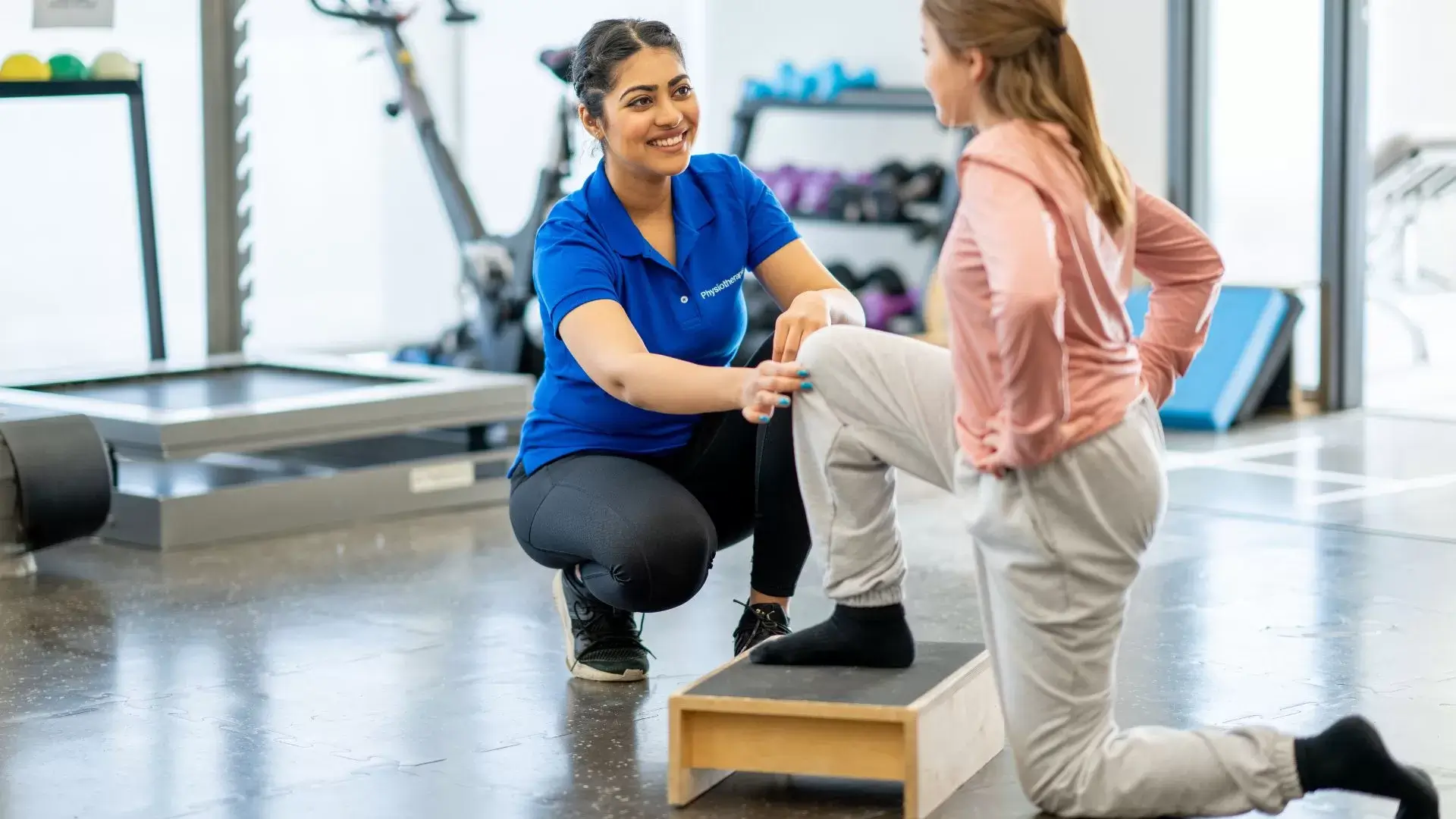At our Best Physiotherapy & Chiropractic Clinic in Mississauga, we recognize that arthritis deeply affects many individuals. Our specialized Physiotherapy for Arthritis services focus on offering customized treatment plans designed to manage pain and enhance mobility. Our compassionate team uses targeted exercises to strengthen surrounding muscles, improving joint function and relieving discomfort. We also provide guidance on lifestyle modifications, diet, and ergonomic practices that support long-term joint health. By fostering an encouraging environment, we guarantee you feel supported throughout your journey. Together, we can navigate the challenges of arthritis and help improve your quality of life—there’s much more to discover about our services and community resources available to you.

At Mississauga Physio Chiro Clinic, we offer extensive physiotherapy and chiropractic services designed to alleviate arthritis symptoms and enhance your overall mobility. Our dedicated team understands the challenges that come with arthritis, and we’re committed to providing effective arthritis treatment tailored to your unique needs.
We focus on arthritis management through personalized plans that include targeted arthritis exercises and arthritis-friendly products. Our arthritis physical therapy sessions are designed to improve strength, flexibility, and range of motion, helping you regain control over your daily activities. We emphasize arthritis-friendly exercises that can be easily integrated into your routine, ensuring you stay active while minimizing pain.
Our compassionate approach means we genuinely care about your journey towards arthritis pain relief. We work closely with you to monitor progress, adapt techniques, and provide ongoing support, fostering a collaborative environment for your recovery.
Arthritis encompasses a variety of conditions that can affect the joints, each with its own distinct causes and symptoms. We often encounter osteoarthritis, the most common form, which typically results from wear and tear on the joints over time. In contrast, rheumatoid arthritis is an autoimmune disorder where the body mistakenly attacks joint tissues, leading to significant joint inflammation and pain.
Psoriatic arthritis, another inflammatory type, occurs in some individuals with psoriasis and can affect both skin and joints. Juvenile arthritis affects children, and its exact causes remain largely unknown, but it can lead to long-term complications. Gout, characterized by sudden, severe pain due to uric acid crystals in the joints, is also a form of arthritis that many people struggle with.
Ankylosing spondylitis primarily affects the spine and can lead to stiffness and fusion of vertebrae. Conditions like lupus can also cause joint inflammation, presenting additional challenges for those affected. Understanding these various types of arthritis helps us appreciate the diverse experiences of individuals living with these conditions and underscores the importance of tailored treatment approaches.
Effective management of arthritis often involves a multidisciplinary approach, with physiotherapy playing an essential role in enhancing mobility and reducing pain for those affected. It is recognized that many individuals experience joint pain, stiffness, and swelling, which can severely impact daily life. Through personalized arthritis exercises, physiotherapy helps us address these symptoms effectively, promoting greater range of motion and alleviating discomfort during arthritis flare-ups.
Moreover, it is acknowledged that arthritis and lifestyle are closely linked. Physiotherapists guide us in incorporating beneficial habits that support joint health, including proper body mechanics and ergonomic modifications at home and work. They also provide valuable education on the use of arthritis home remedies that can complement traditional treatment.
Additionally, participating in arthritis support groups can foster a sense of community and shared experiences, which can be incredibly empowering. Together, we can learn how to better manage our conditions and navigate the challenges that arise. By embracing physiotherapy, we’re taking significant steps toward maintaining our physical well-being, ultimately leading to improved quality of life and enhanced emotional health.
Personalized treatment plans in physiotherapy can greatly enhance our ability to manage arthritis symptoms and improve our overall quality of life. By creating customized arthritis treatment plans, we can address each individual’s unique arthritis diagnosis, focusing on their specific needs and challenges. These plans often include tailored exercise regimens, emphasizing the importance of arthritis and exercise in maintaining mobility and strength.
We know that arthritis medications can help alleviate symptoms, but they’re often most effective when combined with physical therapy. Incorporating arthritis stretches into our routines can effectively reduce stiffness and improve flexibility. Additionally, we recognize that arthritis fatigue can impact daily activities, so our treatment plans consider rest and pacing strategies.
As we age, arthritis can become more pronounced, and we remain committed to integrating the latest arthritis research into our practices. We also understand the link between arthritis and mental health, advocating for strategies that support emotional well-being. Finally, we recommend arthritis-friendly shoes to help with comfort and stability, ensuring we can continue to lead active, fulfilling lives. Together, we can navigate the complexities of arthritis and enhance our overall health.

Many individuals living with osteoarthritis can benefit greatly from targeted physiotherapy methods designed to alleviate pain and improve joint function. In our practice, we focus on specific arthritis exercises that help strengthen the muscles surrounding affected joints, thereby reducing joint degeneration. We also emphasize the significance of maintaining a healthy weight, as excess weight can exacerbate arthritis symptoms and contribute to cartilage damage.
Incorporating an anti-inflammatory diet into our treatment plans plays a vital role in arthritis prevention and management. It’s important to discuss how certain foods can help reduce inflammation and pain. Additionally, we often recommend arthritis yoga, which combines gentle stretching and strengthening exercises, promoting flexibility and relaxation.
For immediate relief, we may suggest the use of arthritis creams that can provide localized pain relief. Through a thorough approach that includes education about lifestyle changes and targeted physiotherapy methods, we aim to empower individuals in their journey toward osteoarthritis relief. Together, we can create a supportive environment that fosters recovery and enhances quality of life.
Rheumatoid arthritis requires a thorough physiotherapy approach that focuses on reducing inflammation, promoting joint mobility, and enhancing overall function. As we navigate this chronic arthritis condition, we acknowledge that it’s an autoimmune arthritis that can greatly impact daily life. Our physiotherapy sessions incorporate exercises tailored to improve flexibility and strength while also addressing the emotional aspects tied to arthritis and stress.
We also encourage patients to explore complementary strategies, like arthritis supplements, which may include glucosamine and turmeric for arthritis, to help manage symptoms. Additionally, we emphasize the importance of arthritis and diet, advocating for anti-inflammatory foods that can support overall health.
Moreover, we recognize that arthritis and sleep are closely linked; therefore, we often provide guidance on sleep hygiene to improve rest quality. By raising arthritis awareness, we empower individuals to take control of their health. Together, we can develop a personalized physiotherapy plan that not only alleviates symptoms but also enhances overall well-being, allowing us to lead more active and fulfilling lives. Let’s work together to manage rheumatoid arthritis effectively and improve our quality of life.
To effectively address the challenges posed by arthritis, we focus on alleviating joint pain and stiffness through targeted physiotherapy techniques that enhance mobility and comfort. For individuals suffering from knee arthritis and hip arthritis, we design personalized exercise programs aimed at strengthening muscles and improving joint function. Incorporating arthritis braces can also provide additional support and stability during everyday activities.
We understand that arthritis in women often presents unique challenges, particularly regarding daily tasks and work-related activities. Our compassionate approach combines education on arthritis hot and cold therapy, which can help manage inflammation and discomfort effectively.
Moreover, we recognize the impact of arthritis and disability on quality of life, and we’re dedicated to helping our clients regain independence through gradual rehabilitation. We also advocate for arthritis research funding to enhance treatment options and outcomes for all affected individuals.
In addressing lifestyle factors, we discuss the implications of arthritis and smoking, as well as strategies to mitigate these effects. Together, we’re committed to fostering better health and well-being for those living with arthritis, supporting them every step of the way.
Specialized physiotherapy plays an essential role in managing juvenile arthritis, helping children improve their mobility and overall quality of life through tailored exercise programs and supportive interventions. It is clear that arthritis in children can be challenging, affecting various joints such as the hands, wrists, shoulders, ankles, and spine. Our physiotherapy sessions are designed to address these specific areas, providing children with a safe environment to strengthen their muscles and enhance flexibility.
Using techniques that incorporate chondroitin and other supportive measures, we focus on alleviating pain and preventing further joint damage. For instance, we recommend using arthritis compression gloves, which can help reduce swelling and provide stability for hand arthritis. Each child’s condition is unique; as a result, our approach is customized to their specific needs.
We also emphasize the importance of educating both parents and children about managing juvenile arthritis effectively. By empowering families with knowledge and practical tools, we can foster a supportive atmosphere that encourages ongoing progress. Together, we can work towards improving the daily lives of children battling juvenile arthritis, enabling them to engage in activities they love without the limitations of their condition.

Managing arthritis fatigue and swelling effectively is essential for improving our patients’ overall well-being and daily functioning. At our clinic located at 1834 Lakeshore Rd W unit 6C, Mississauga, ON L5J 1J7, we recognize how conditions like finger arthritis can lead to debilitating fatigue and discomfort. Our compassionate approach includes tailored physiotherapy treatments that focus on reducing inflammation and enhancing mobility.
We acknowledge that factors like arthritis and weather can greatly affect our patients’ symptoms. That’s why we emphasize the importance of personalized exercise regimens and manual therapy techniques. By addressing both physical and emotional aspects of arthritis, we help our patients regain energy and manage fatigue.
Moreover, we explore how arthritis and genetics may play a role in individual experiences, allowing us to refine our treatment plans further. We also take into account lifestyle factors, such as arthritis and alcohol consumption, which can exacerbate symptoms.
For anyone looking to tackle arthritis fatigue and swelling, we encourage reaching out to us at (647) 372-1209. Together, we can develop an extensive strategy tailored to your unique needs, empowering you to live a more vibrant life.
Regular physiotherapy can markedly slow the progression of arthritis, helping patients maintain their mobility and quality of life. By engaging in consistent therapy sessions, we can enhance joint function, reduce stiffness, and improve overall strength. This proactive approach allows us to manage symptoms more effectively and prevents further deterioration.
Through tailored exercise programs, our physiotherapists guide us in techniques that promote joint health and flexibility. These exercises not only alleviate pain but also work to strengthen the surrounding muscles, providing better support for our joints. Additionally, education plays an important role; understanding our condition enables us to make informed choices about daily activities and self-care.
Moreover, regular physiotherapy can help us learn proper body mechanics, reducing the risk of injury and strain on affected joints. Incorporating these practices into our routine fosters a sense of empowerment, as we become active participants in our own health management.
Ultimately, by committing to regular physiotherapy, we can considerably slow the progression of arthritis, allowing us to lead more active and fulfilling lives. It’s a journey of resilience, and together, we can navigate it with informed support and compassionate care.
After addressing the challenges of arthritis through consistent physiotherapy, we now focus on the rehabilitation process following joint replacement surgery, which is fundamental for restoring function and enhancing recovery. This phase is critical, as it helps us regain strength, mobility, and independence after such a significant procedure.
Initially, our physiotherapy sessions will concentrate on gentle movements and exercises to promote healing. We’ll work closely with our patients to guarantee that pain is managed effectively, and we’ll gradually introduce more challenging exercises aimed at improving flexibility and strength. It’s essential that we establish a personalized rehabilitation plan, tailored to individual needs and recovery goals.
As we progress, our focus will shift to functional activities, enabling our patients to return to daily tasks with confidence. We believe in the importance of education during this phase, so we’ll guide our patients on techniques to prevent future injuries and maintain joint health.
Through consistent support and encouragement, we’ll help our patients navigate this journey, making sure they feel empowered every step of the way. Together, we’ll work towards achieving ideal recovery and enhancing overall quality of life.
A well-rounded approach to arthritis care combines physiotherapy with a nutritious diet, allowing us to address the condition’s symptoms more effectively and promote overall well-being. By integrating these two key components, we can enhance our treatment strategy, making it more thorough and supportive of our health journey.
Incorporating anti-inflammatory foods, such as omega-3 fatty acids found in fish, nuts, and seeds, can greatly reduce joint pain and stiffness. Likewise, maintaining a balanced diet rich in antioxidants—found in fruits and vegetables—helps combat oxidative stress that exacerbates arthritis symptoms.
Physiotherapy complements this dietary approach by improving joint function, flexibility, and muscle strength. Together, these elements empower us to manage pain more effectively and increase our overall mobility.
Additionally, collaborating with a registered dietitian alongside our physiotherapist can offer tailored nutrition plans aimed at our specific needs. This holistic approach not only helps alleviate discomfort but also works toward preventing further joint damage. By embracing both physiotherapy and dietary modifications, we’re taking proactive steps toward improving our quality of life while living with arthritis.
Improving our spine health and posture can considerably alleviate arthritis-related pain and discomfort, enhancing our overall mobility and quality of life. When we maintain proper alignment, we reduce strain on our joints and muscles, which is essential for those of us managing arthritis.
We can start by being mindful of our posture throughout daily activities. Whether we’re sitting at a desk, standing in line, or lifting objects, maintaining a neutral spine helps distribute our body weight evenly. Using ergonomic furniture and supportive tools can also make a significant difference.
Incorporating gentle spinal exercises into our routine can strengthen the muscles that support our spine. These exercises promote flexibility and reduce stiffness, making it easier for us to engage in daily tasks without exacerbating our arthritis symptoms. Additionally, we should pay attention to our body’s signals; if something doesn’t feel right, we must adjust our movements accordingly.
Finding relief from arthritis pain often begins with incorporating targeted exercises and gentle stretches into our daily routine. By engaging in these activities, we can help improve our joint flexibility, strengthen the muscles around our joints, and ultimately reduce discomfort. It’s important to approach these exercises with care, focusing on low-impact movements that won’t exacerbate our condition.
Simple range-of-motion exercises, such as shoulder rolls and wrist flexes, can be beneficial for maintaining mobility. We might also consider incorporating stretches like the cat-cow pose, which can alleviate tension in our spine and enhance overall flexibility.
Aquatic exercises are another excellent option, as they provide resistance without putting undue stress on our joints. Even walking at a comfortable pace can greatly contribute to our physical well-being.
Before starting any new exercise regimen, consulting a physiotherapist is vital. They can tailor a program to our specific needs and limitations, ensuring we engage safely and effectively. By committing to these pain-relieving exercises and stretches, we can empower ourselves to manage arthritis pain and enhance our quality of life.
Targeted physiotherapy plays an essential role in managing arthritis for women and seniors, addressing their unique needs and enhancing their overall well-being. We recognize that arthritis can considerably impact mobility and daily activities, often leading to pain and frustration. Our approach to physiotherapy focuses on personalized treatment plans that consider the specific challenges faced by these demographics.
For women, hormonal changes can influence arthritis symptoms, and our targeted exercises aim to alleviate discomfort while improving strength and flexibility. In seniors, we acknowledge the importance of maintaining independence; consequently, we emphasize functional movements that help them navigate their daily routines with ease.
Our therapists utilize evidence-based techniques, including manual therapy and tailored exercise programs, to guarantee effective outcomes. We also incorporate education on joint protection and lifestyle modifications, empowering our clients to manage their condition proactively.
With compassion and expertise, we endeavor to create a supportive environment where women and seniors feel heard and cared for. Together, we can work towards improving their quality of life and fostering a sense of control over their health.
If you’re struggling with arthritis in Mississauga, we’re here to provide compassionate physiotherapy support tailored to your needs. Our dedicated team understands the unique challenges arthritis can bring, and we’re committed to helping you regain your mobility and improve your quality of life.
We take the time to assess your specific situation, considering factors like your lifestyle, pain levels, and personal goals. By developing a customized treatment plan, we focus on strengthening your muscles, increasing flexibility, and reducing pain through targeted exercises and manual therapy techniques.
We also emphasize education, empowering you with knowledge about your condition and how to manage it effectively. Our holistic approach means we don’t just treat the symptoms; we aim to address the underlying issues contributing to your discomfort.
You don’t have to navigate this journey alone. We’re here to support you every step of the way, providing the encouragement and expertise needed to help you thrive. So, if you’re ready to take control of your arthritis management, contact us today. Together, we can work towards a more active and fulfilling life.
As we support our clients in managing arthritis, it’s important to acknowledge the vibrant city of Mississauga, a place that offers a rich blend of community resources and recreational opportunities for those seeking an active lifestyle. Known for its diverse population, Mississauga fosters a welcoming environment that encourages inclusivity and engagement.
The city boasts numerous parks, trails, and recreational facilities designed to promote physical activity, which is essential for individuals dealing with arthritis. From the scenic Credit River to the expansive Lakefront Promenade, residents can enjoy outdoor activities that enhance their well-being. Additionally, Mississauga offers various community centers and programs specifically tailored for seniors and those with mobility challenges, ensuring everyone has access to supportive resources.
Moreover, we find that local healthcare providers, including physiotherapists and specialists, are committed to offering expert care tailored to individual needs. This collaborative spirit helps create a strong support network for our clients, allowing them to take charge of their health. In Mississauga, we’re not just treating arthritis; we’re fostering a community where everyone can thrive despite their challenges.

When it comes to treating arthritis, physiotherapists have extensive qualifications. They typically hold a degree in physiotherapy, which includes specialized training in musculoskeletal conditions. Many also pursue additional certifications in manual therapy or exercise prescription. With our knowledge of anatomy, physiology, and rehabilitation techniques, we can create individualized treatment plans. It’s important for us to stay updated on the latest research to provide the best care and support for our patients.
Typically, a physiotherapy session for arthritis lasts about 30 to 60 minutes. We’ll usually start with an assessment, followed by targeted exercises and techniques to improve mobility and reduce pain. It’s important to remember that the duration can vary based on individual needs and treatment goals. We aim to provide personalized care, ensuring we address any specific concerns you might have during each session, making the experience as beneficial as possible.
When we consider the potential side effects of physiotherapy, it’s essential to acknowledge that they’re generally minimal. Some of us might experience temporary soreness or fatigue following a session, which usually resolves quickly. We should also be mindful that if we have underlying conditions, communication with our therapist is key to ensuring a safe experience. Overall, the benefits often outweigh any minor discomfort we might feel during our recovery journey.
Yes, physiotherapy can absolutely be done at home for arthritis management. We can incorporate exercises tailored to our needs, focusing on flexibility, strength, and pain relief. With guidance from a healthcare professional, we can learn proper techniques and routines that fit our lifestyle. It’s important to stay consistent and monitor our progress. By taking this approach, we can enhance our mobility and overall well-being from the comfort of our own homes.
When it comes to attending physiotherapy for arthritis treatment, we usually recommend starting with one to two sessions per week. This frequency allows us to effectively assess our progress and adjust our treatment plan as needed. Over time, we can reassess and potentially reduce the frequency based on our improvements and goals. Consistency is key, so maintaining a regular schedule helps us manage symptoms and enhance our overall well-being.
Reach out to us today to book an appointment or learn more about our services. Our friendly team is here to answer your questions and help you take the first step toward improved health and wellness.
(647) 372-1209

At our “Mississauga Physio Chiro Clinic”, we are dedicated to providing personalized care that addresses the root cause of your discomfort. With a team of experienced physiotherapists and chiropractors, we focus on restoring your mobility, relieving pain, and enhancing your overall well-being.